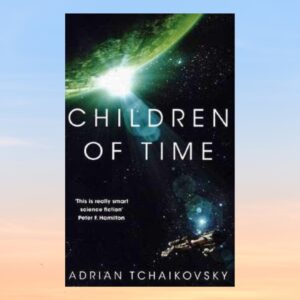This summer, building on our list from last year, we’re offering reading recommendations for people to enjoy wherever and whenever they travel. This is the first in a series of posts to come from our in-house staff and editors. Enjoy.
I delight in reading fiction because it wrestles me away from the tyranny of the present and the predictability of the status quo. It challenges me to think about issues that span generations, not just political and economic cycles, and connects me to a sense of humanity that transcends cultural and historical boundaries. Here are three novels that inspired me this year, which you can enjoy in print or as audiobooks.
 Children of Time (2015)
Children of Time (2015)
By Adrian Tchaikovsky
Few novels that I’ve ever read offered so many different threads (pun intended) to reflect on. This book about a human encounter with a sentient spider civilization does that in at least six ways. First, gender dynamics: in the spider community, females hold the power of life and death over the males. How does a male think about that? What should one do? What would a desirable alternative look like?
Second, what might high intelligence, communication, and technology look like in another species? The sentient spiders share certain qualities with humans, but diverge in others.
Third, if humans developed the power to dramatically influence the course of evolution, what might result from such tinkering?
Fourth, if humans despoil the planets in their own solar system, they may journey to the stars to find a new home. If their only viable alternative is a planet already home to sentient beings, do they have a right to colonize it, welcomed or not? When a species faces extinction, should it not do everything in its power to survive?
Fifth, does the human creator of the spiders have any moral obligation to the survival of the remnant of humans, knowing that they would seek to wipe out the sentient beings that she was responsible for creating?
Sixth, could there be a basis of society that’s more communalistic that would enable populations to co-exist in greater harmony than humans are accustomed to?
 Blood Music (1985)
Blood Music (1985)
By Greg Bear
My time at the John Templeton Foundation has led me to take a greater interest in developmental biology and the myriad questions it evokes. How exactly does intelligence develop within a configuration of billions of individual cells, none of which we’d consider “intelligent” in isolation? What happens when normal biological development is interrupted and the organism, or parts of it, are placed in entirely different environments to adapt to?
Cells untethered from their usual constraints could behave in highly unpredictable ways. Biological research like this would need to be carried out with the strictest possible protocol. What could happen if a rogue researcher intentionally injected himself with experimental cell cultures in order to smuggle them out of a high security lab? Such is the scenario of Blood Music.
This narrative made me wonder if the cumulative efforts of bioengineering could eventually lead to a dramatic shift in the evolution of life, comparable in magnitude to the rise of eukaryotes from prokaryotes. I think we can safely say that we have no idea where scientific innovation is going to lead us by the end of our current century. It’s going to be a wild ride.
 Mockingbird (1980)
Mockingbird (1980)
By Walter Tevis
I came to this book knowing only that Walter Tevis was the author of The Queen’s Gambit. This story could not be more different. It starts with a familiar trope: a future in which the world and all its difficult responsibilities are handled by robots powered by artificial intelligence so that humans can lead lives of leisure.
The trouble is, it’s just not that enjoyable. Suicide rates are alarmingly high, birthrates have plummeted, and there is really no imagination or aspirations for anything different. There’s limitless pleasure, comfort, and entertainment available to every member of society—isn’t that a dream come true?
The story stands out by its complexity of characters. The leading AI robot, Spofforth, struggles with his identity and purpose while holding together a decaying society. He is both architect, caretaker, and destroyer of what remains. The leading human character, Bentley, rediscovers literacy, rekindles his imagination, and comes into direct conflict with the status quo. What kind of world do we want to inhabit, and what roles should humans and machines play in it? This story offers much to ponder.

 Children of Time
Children of Time  Blood Music
Blood Music Mockingbird
Mockingbird